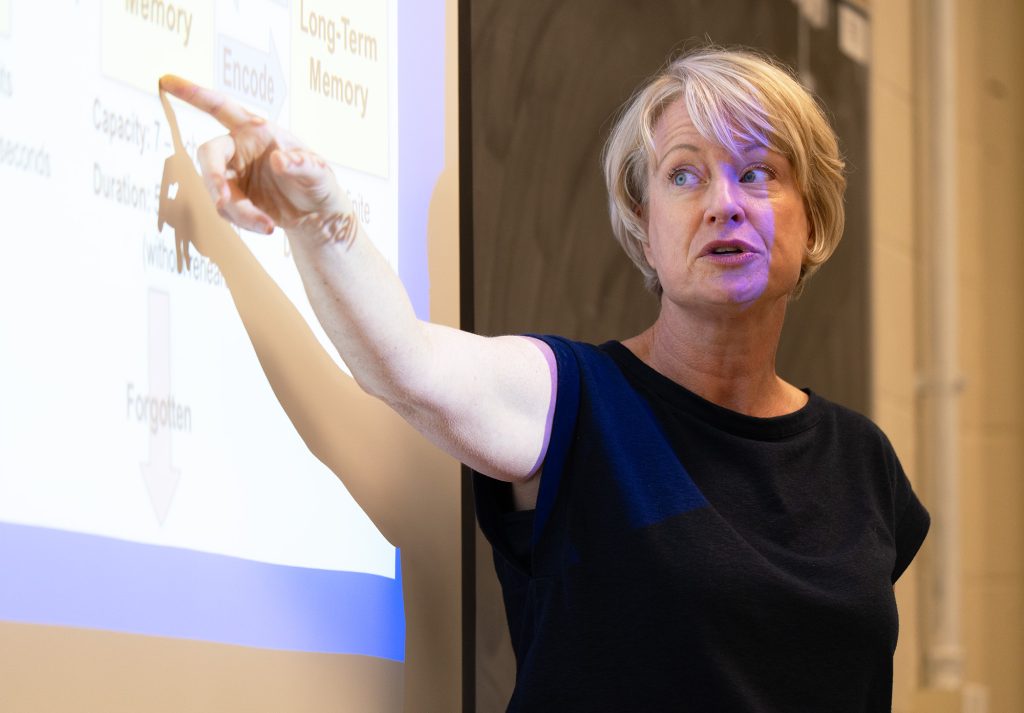
Story and photos by Logan Jackson
The Medical College Admission Test (MCAT) is widely considered to be one of the most difficult standardized exams due to its format, expansive content and high-stakes nature. The preparation that students must do before the exam is vital, and the Honors College is offering a course to aid students on that journey.
The High Impact Study Strategies for MCAT Prep (GN_HON 4070H) course brings together students from across the Mizzou campus to try new study techniques, take practice exams, complete self-evaluations and work through stress-reduction exercises. The course is taught by Darcy Holtgrave, manager of the MedOpp Advising Office, which offers pre-professional advising for students pursuing degrees in many medical fields.
“Several years back, some test prep companies offered in-person classes in the Columbia area,” Holtgrave said. “Those courses went online, but I’ve talked to so many students who really want that in-person support. It’s honestly been a dream of mine to be able to provide this support for students who are going to take the MCAT, so when the opportunity presented itself, I was thrilled to help make the course a reality.”
The course was first offered last semester with the help of a MizzouForward grant. That grant was used in a few different ways, including hiring a test prep consultant, Amanda Brem. Brem created and founded The Brem Method, which helps students strategize and build confidence before the exam. Holtgrave met Brem at a conference a few years back and appreciated her approach to the MCAT.
“I had an informal conversation with her about my dream of bringing an MCAT test prep course to Mizzou students,” Holtgrave said. “Amanda has a background in athletics, and part of her approach to the MCAT is from a coaching perspective and thinking about the process as something a student is training for. When we got the grant, I was thrilled to be able to work with her and bring her strategies to our students.”

Holtgrave also consulted with an advisory board of current medical school students and students who had recently taken the MCAT, as well as a group of faculty who could provide expertise in key areas, such as biology and biochemistry. While Holtgrave had gathered plenty of information to spearhead the course, there was still a discussion on who would teach it. Holtgrave volunteered.
“I was a bit reluctant at first,” Holtgrave said. “I’m not a scientist, so I knew I couldn’t teach the students specifics about those disciplines. But during our focus groups with students who had taken the exam, they talked about wanting someone keep them accountable and help them develop strategies for success. They wanted that coaching aspect, which is something I knew I could do.”
Fifteen students participated in the course this past spring and 20 students are enrolled in the course this fall. The plan is to continue to offer the class during the fall semester, as students typically take the exam during the spring. While the course is housed in the Honors College, students do not have to be pursuing the Honors Certificate to enroll in the class.
The course mixes in guest lectures, open discussions and strategy sessions. Students also do full-length practice exams, complete weekly practice questions and read a nonfiction book.
“The book recommendation (Thinking Fast and Slow, written by Daniel Kahneman) might be my biggest takeaway, honestly. I will be bringing it up for years,” said Todd Lancaster, a senior nutrition and exercise physiology major who is pursuing the Honors Certificate. “As far as the course specifically, it reassured me that the MCAT was something every doctor has taken and survived, and it doesn’t have to be terrible or daunting. The weekly meetings put little bits and pieces in at a time, with study strategies, ideas to cope with test anxiety and methods for reading large dense passages. But the overarching message was that ‘You can do this. It’s going to be OK.’ Dr. Holtgrave’s genuine support throughout the semester was a huge part of relaying this message.”
Lancaster took the course last semester and took the MCAT in May. He said he appreciated one of the primary focuses of the course, which is to create an atmosphere where students collaborate instead of compete.
“Two problems usually stand in the way of productive conversations about the MCAT; many pre-med students, at least in the first couple years, are super competitive,” Lancaster said. “Many conversations inevitably turn into comparisons. And with discussions specifically about the MCAT, it’s usually very negative. The way it’s talked about reminds me of the characters in the beginnings of horror movies, huddled around a campfire with hushed conversations about the monster in the forest. This class kind of solved both issues by fostering an honest and brag-free environment focused on what we all had in common, dreams of being physicians, with a big test in the way. We could have really productive conversations without any negativity or comparison between each other.”
Holtgrave also has students break out of their comfort zone and try new strategies. She wants to foster an environment where students are willing to try anything, even if they’re a bit hesitant.
“We didn’t just study for the MCAT the entire time; we worked on specific exercises and plans to shake out those nerves, which is inherently pretty vulnerable,” said Makinley Smith, a senior health science major who enrolled in the course last semester. “I think that allowed us to build a community. We were really open and honest with each other, which can be something that’s a bit challenging as a pre-med student.”
Holtgrave encourages students to think not just about the test. She makes sure students focus on the importance of sleep, eating right and controlling stress. They develop study plans and discuss taking care of their mental health.
“The strategies I learned in the course have been useful beyond the MCAT, which I really appreciate,” Smith said. “The preparation I put in before I took the actual test was vital, and I don’t know if it was something I would have done on my own. The course helped me feel ready for the test in so many ways, especially when it came to calming myself down and focusing on the task at hand.”
Through nearly two semesters of the course, Holtgrave said she’s been inspired by the students she’s been able to interact with. She has built incredible relationships with students through her role with the MedOpp Advising Office, and this opportunity has strengthened a lot of those ties.
“I can’t tell you how grateful I am to work with these students,” Holtgrave said. “They’re so inspirational in the work that they’re doing, so much so that I decided to go back to school to get my Positive Psychology Certificate. I want to find even more tools to help students in the course. I want to provide the learning tools and skills that will sustain them through medical school and beyond. They’re going to be lifelong learners, so helping them develop good habits and attitudes is so important. I want them to be confident in their abilities because they are capable of so much.”